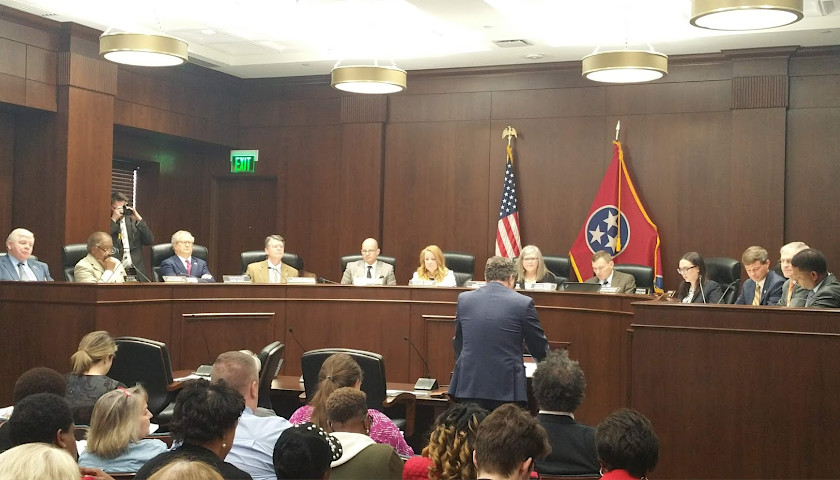NASHVILLE, Tennessee – Elements of Governor Bill Lee’s focus on education, which he talked about on the campaign trail, his inaugural address and more recently in his first state of the state address, including an emphasis on parents having more school choice as well as civics education and “unapologetic American exceptionalism,” are making their way through the State House committee process.
“Administration bills,” as they are called, are those that are initiated by the Executive Branch of the state government. That could be the Governor as the chief executive, or any of the numerous state departments within the executive branch.
It is one role of the Majority Leader of each legislative body to be the primary sponsor of an administration bill, which would be Senator Jack Johnson (R-Franklin) and Representative William Lamberth (R-Cottontown) in the Senate and House, respectively. As House Majority Leader Lamberth explains it, the bills are most often “carried” by another member in the House, although, in his role, he would ensure that the administrative process is properly executed.
Generally, the first co-prime sponsor of a bill in the House would be the Assistant Majority Leader, in this case, Representative Ron Gant (R-Rossville).
In the case of the Governor’s Civics Instructional Seal initiative, Assistant Leader Gant is carrying the legislation as HB 0944, which he said he was eager to do as he introduced the bill to the House Curriculum, Testing & Innovation Subcommittee.
Gant explained that the program is meant to highlight high quality civic education programs throughout the state and it will serve as a scoring apparatus to judge how well a school and district is teaching civics education, which he called “essential in preserving our constitutional democracy.”
Asking, rhetorically, why is this necessary, Gant responded, “Schools are insufficiently teaching students the basic principles of civics which is resulting in fewer and fewer individuals with basic institutional knowledge.”
Quoting some alarming statistics to back up the statement, Gant continued, “According to the Woodrow Wilson National Fellowship Foundation, the majority of Americans in every state, except Vermont, would fail a test based on the U.S. citizenship test. Only 27 percent of Americans under age 45 would have been able to pass the test and Tennessee’s rankings were especially low. Only 38 percent of Tennesseans can pass the test and only 13 percent score B or higher.”
With widespread sensitivity to testing, Gant addressed that by saying, “Tennessee already mandates that high school seniors must take a civics exam in order to graduate, though they do not have to pass. This initiative seeks to strengthen this measure by rewarding those who pass and achieve a certain standard.”
Gant pointed out that there is a direct correlation between civics education and civic engagement, which he connected to the state’s election turnout, adding, “Currently Tennessee’s voter participation rate is 29.9 percent between the ages of 18 and 24, the third lowest in the nation. While this single metric is not a complete reflection of Tennessee’s position, it is an indication of how we fare in comparison to the rest of the nation,” concluding his presentation of the bill.
Subcommittee member, Representative John DeBerry (D-Memphis) expressed that he thought this is “a wonderful bill and wonderful initiative.” Elaborating, DeBerry said that he loves the bill and that he thinks “a lot of the ills we have as far as our citizens not being committed to the country and better citizenship stem from what we’re not teaching, the things that we were taught when we were kids.”
DeBerry went on to ask who would teach civics, expressing concern that more responsibilities are constantly being added and that there used to be teachers specifically for civics.
Department of Education Assistant Commissioner, Elizabeth Fiveash, called upon to answer DeBerry’s inquiry, responded, “There is funding in the budget to provide additional training and professional development for civics educators.”
By voice vote, the bill was unanimously moved on to the full House Education Committee, where it is scheduled to be heard March 20.
Heard in the same House subcommittee as another administration bill is what is being referred to as the Charter Authorizer bill, carried by House Education Committee Chairman Representative Mark White (D-Memphis) as HB 0940 covered in a 45-page amendment not yet available on line.
As Governor Lee said in his state of the state address, “Tennesseans would have to be bold, courageous and strong in the face of today’s biggest challenges,” with “one of those challenges being the gap between the quality of education offered to students regardless of their zip code.”
Specific to charter schools, Governor Lee said, “I believe highly accountable public charter schools are a great model for expanding choice without sacrificing quality, and I’ve seen firsthand how they can dramatically impact the life and trajectory of a student.”
To that end, the Governor committed, “I will support legislation this year that makes it easier to open good charter schools and easier to close bad ones,” in addition to doubling the amount of public charter school facility funding in his budget.
In his introduction of the charter authorizer bill to the subcommittee members, White’s recurring theme was to look at the issue room a 50,000 foot level as he encouraged keeping an open mind and making this the start of a discussion.
He mentioned the one million students in grades pre-K through 12 across the state, and offering a reminder of their mission, White said, “There’s no reason for us to be in committee at all, if we’re not putting them first.”
White said that the last eight years under Governor Haslam saw a lot of changes and reform, resulting in Tennessee being the fastest improving state in the nation, but also recognized the continual process, “I don’t think there’s anybody on the committee or in this room who would think we don’t have a long ways to go.”
Citing what he called “a fact,” White added an unsatisfactory statistic that, “Only 37 percent of our third graders are reading on grade level at the end of third grade.” And, the situation doesn’t get much better as students move along through the twelfth grade. According to White, “As our students come out of high school, there are still far too many who need remedial courses in English and Math before they on to higher education.”
Reviewing the history of state legislation regarding charter schools, White said that back when Beth Harwell was a Representative in 2002, she brought forward the first charter school bill to the General Assembly which included a cap. In 2011, after arriving in 2010, Harwell asked White to carry the bill that took the caps off. Since that time, there have been many, many changes, White pointed out, including the creation of the achievement school district.
At that point, White said he would get into the “meat of the bill,” which started with a review of the current three authorizing agents in the state of Tennessee for a charter school.
The first is an achievement school district, which is a failing school in the bottom five percent, which is then taken over by the state as the authorizing agent and potentially running it, or turning it over to an independent charter, which is most often the case.
The second authorizing agent is the LEA or local school district.
The third option, which White said was passed just a few years ago, is the state board of education, which comes into play when an LEA denies a charter application. The charter school has the ability to appeal an LEAs decision to the state board, at which point, the state board can either agree or disagree with the LEA.
If the state board agrees with the LEA, the issue is closed for a year. If the state board disagrees with the LEAs denial, the LEA has the option of running the charter school or turning it back to the state board of education to run.
White said the proposed legislation would not address either the achievement school district or the LEA, leaving them both to operate as normal.
Explaining the request of Governor Lee and the administration, White said the bill moves the authorizing agent role away from the state board of education and moves it to a new charter school commission to deal solely with the topic, including establishing the best practices for charter schools. Said White of current charter schools, “We have charters, and we’re doing them, but we have struggles.”
White also alluded to the struggle that goes on when an LEA is turned down and the ensuing back and forth, as he gave a visual by bumping his fists together.
White repeatedly mentioned the impact and speed with which technology is changing the education world. He also brought up several times that innovation and disruption, as it is in the private sector, is good and needed in the education system, because it’s easy to become complacent.
Then, getting to the details, White said the charter commission , consisting of nine members set up by the Governor and approved by the General Assembly would be the agent that oversees the state authorizing program.
Representative Tom Leatherwood (R-Arlington), a former educator, was the first to comment, expressing concerns with the legislation as well as his appreciation for White’s explanation. Leatherwood also acknowledged some of the issues with the current system and recognized the benefit of the newly established commission that could focus on the process of approving and overseeing the charter school, which he conceded could be burdensome.
Leatherwood said that basis of his concern with the legislation is the removal of the LEA from the process as the initial point.
Representative Charlie Baum (R-Murfreesboro) expressed similar sentiments, seeing the advantage to the specific commission with expertise in examining charter school applications, but was also concerned about the lack of an opportunity for local school boards to comment on the charter applications and the potential unfamiliarity of the commission with local issues and the LEA.
Also speaking on the local control issue was Representative Vincent Dixie (D-Nashville).
White responded that if the commission comes to fruition, it would be one of their duties to be “about local communities.” Then, seemingly offering a counterpoint, White added, “We’re all for local control until we’re not up here,” adding that there are arguments on both sides.
Holding his two hands horizontally about a foot apart, White demonstrated where the discussion is needed as a state and where the focus tends to be. White said, “A lot of times, we get so hung up in local politics, our own schools,” even pointing to himself living in Memphis for 52 years and going to school there 40 years ago, that a good honest conversation can’t be had about moving all of the schools forward so they can meet the challenges of the 21st century.
Members of the administration, Elizabeth Fiveash, Assistant Commissioner of Education; Nathan James, Deputy Executive Director of the State Board of Education; and Brent Easley, the Governor’s Legislative Director, came forward to respond to questions by the committee members.
With regard to local involvement, Fiveash said that the process currently requires applicants to explain the detailed community need and any community engagement they’ve done. Additionally, the commission would hold open public meetings allowing input from the district as well as the opportunity that is available for conversations with the commission off-line. Fiveash agreed, “There will definitely have to be engagement between the commission and local boards to ensure the needs were met.”
To Representative DeBerry’s inquiry about how the process would actually work, Fiveash spoke of a new provision within the legislation that once an applicant chose to go directly to the commission or the LEA, there would be no appeals process and there would a one-year wait period before being able to re-submit a new application. On a renewal, however, appeals would be available.
A long-time proponent of school choice, Representative Bill Dunn (R-Knoxville) offered a kind of definition about charter schools, calling it a contract school where there is a commitment to deliver something. “And,” Dunn added, “if they don’t deliver it, then they go away, which is different than the way we do LEAs.”
DeBerry made the point that there is a perception and that perception is reality that will have to be dealt with regarding the legislation. The perception is that a it will create a “quickie path” for a charter school that would work against the best interest of the LEA.
Easley responded, “It is absolutely our intent that it is not just some easy path to replicating schools,” assuring that quality will be ensured throughout the process.
Once discussion as well as questions and answers had wrapped up, White looked to get an idea of how the committee members would vote. While some members expressed that they’d like to continue the work in the subcommittee, some were mindful of the end of the legislative calendar approaching.
It was DeBerry, though, who had a different take in that while it is a good committee, he said, it is also a closed society where the same things will be said and the votes will be the same next week. DeBerry made the point that to get diversity of opinions and to hear from more people, they were going to have to move the bill out to the full committee.
White said he thinks the administration has heard what they have said and that by the next committee, there will be an opportunity to look at the issues. Seemingly tentative on the outcome of the vote, White said, “I don’t want to lose this bill, but it would be my will to go ahead and move it out.”
After nearly an hour of discussion, on voice vote and without any dissenters, subcommittee Chair Debra Moody (R-Covington) ruled the Ayes have it.
HB 0940 is scheduled to be heard in the full House Education Committee on March 20.
Video on HB 0944 and HB 0940 can be watched here and then clicking on the bill number.
The GIVE Act or the Governor’s Investment in Vocational Education Act, under SB 0805 and HB 0949 is scheduled to be heard on March 19 in the Senate Finance Ways and Means Committee and in the House Education Committee on March 20.
As reported by The Tennessee Star, Governor Lee’s anticipated Education Savings Account (ESA) initiative under HB 0939 is scheduled to be heard in the House Curriculum, Testing & Innovation Subcommittee on March 19. In the Senate, SB 0795 has been referred to the Education Committee, but has not yet been scheduled to be heard.
– – –
Laura Baigert is a senior reporter at The Tennessee Star.






[…] Lee’s civics initiative made its way through the State House in March, The Tennessee Star reported. […]
[…] The rewrite was an outcome of the administration listening to the concerns of the subcommittee, as reported by The Tennessee Star, and subsequently making major changes to the bill in […]
[…] Committee Mark White (R-Memphis), who is carrying Governor Lee’s legislation known as the charter authorizer under HB 0940, said he is a supporter of the concept of ESAs and has been for 10 years, but perhaps sensing some […]
OK, to some, this might sound a bit nitpicky, AND, we certainly DO appreciate the sentiment behind Representative Gant’s goal and statement “essential in preserving our constitutional democracy.”… BUT, the United States is a constitutional republic! BIG DIFFERENCE!!!
A Democracy is 50.000001% rule while the other 49.000009% have to follow what the “majority” dictate (aka mob rule). A constitutional Republic has elected representatives, who are bound (supposedly) by a written set of limitations (aka the Constitution) with the intent to protect the “little” guys!
Maybe if we restart teaching truthful American civics and American exceptionalism to our kids, as Governor Lee so astutely recognizes the need for, we will fix some of the issues in this country!
Excellent comment
Assistant Leader Gant refers to our form of government as a “constitutional democracy” when, in fact, we are a constitutional REPUBLIC! And this is the guy that is carrying the bill to institute testing standards. You can’t make this stuff up.